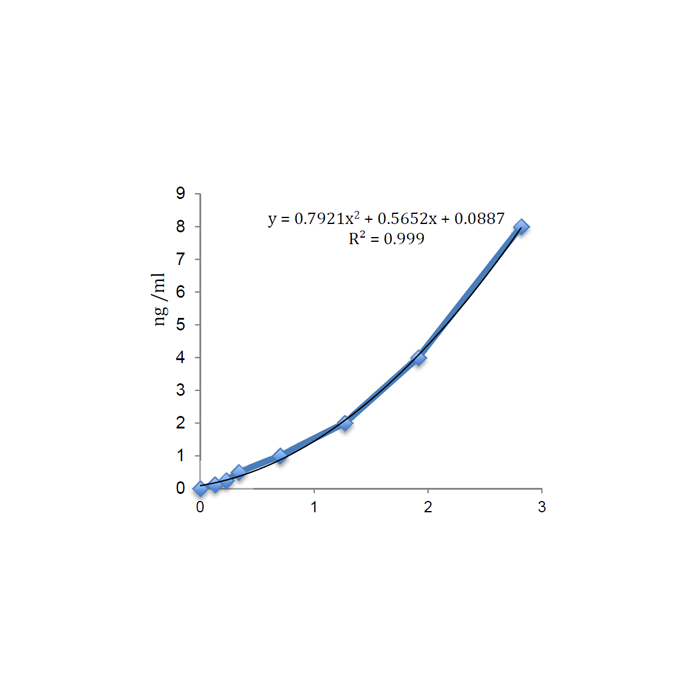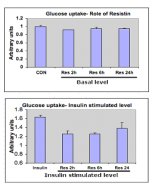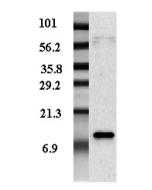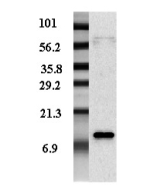Cookie Policy: This site uses cookies to improve your experience. You can find out more about our use of cookies in our Privacy Policy. By continuing to browse this site you agree to our use of cookies.
AdipoGen Life Sciences
Resistin (human) ELISA Kit

| Product Details | |
|---|---|
| Synonyms | FIZZ3; Found in Inflammatory Zone 3; ADSF; Adipose Tissue-Specific Secretory Factor |
| Product Type | Kit |
| Properties | |
| Application Set | Quantitative ELISA |
| Specificity | Detects human resistin. Does not cross-react with mouse resistin, rat resistin, human RELM-β, mouse RELM-α, mouse RELM-β, rat RELM-α, human leptin or human adiponectin. |
| Crossreactivity | Human |
| Quantity |
1 x 96 wells 2 x 96 wells (Twin Plex) |
| Sensitivity | 100pg/ml |
| Range | 0.125 to 8ng/ml |
| Sample Type |
Cell Culture Supernatant Plasma Serum |
| Assay Type | Sandwich |
| Detection Type | Colorimetric |
| Shipping and Handling | |
| Shipping | BLUE ICE |
| Short Term Storage | +4°C |
| Long Term Storage | +4°C |
| Handling Advice |
After standard reconstitution, prepare aliquots and store at -20°C. Avoid freeze/thaw cycles. Plate and reagents should reach room temperature before use. |
| Use/Stability | 12 months after the day of manufacturing. See expiry date on ELISA Kit box. |
| Documents | |
| Manual |
 Download PDF Download PDF |
| MSDS |
 Download PDF Download PDF |
| Product Specification Sheet | |
| Datasheet |
 Download PDF Download PDF |
Resistin (FIZZ3; ADSF; Adipose tissue-specific secretory factor) is a 12.5kDa cysteine-rich adipocytokine. In rodents, increased resistin-levels impair insulin action, while genetic ablation or down-regulation of the resistin gene improves insulin sensitivity. In humans most reports identified inflammatory cells and bone marrow-derived cells as the main source of resistin, indicating a role in inflammatory responses. Plasma resistin levels were shown to be associated with C-reactive protein (CRP), inflammatory bowel disease, Crohn’s disease, atherosclerosis and acute pancreatitis. Atherosclerosis and obesity are increasingly viewed as chronic inflammatory conditions. Circulating resistin levels were reported to be increased in obesity and diabetes.
- Plasma resistin concentrations measured by enzyme-linked immunosorbent assay using a newly developed monoclonal antibody are elevated in individuals with type 2 diabetes mellitus: B.S. Youn, et al.; J. Clin. Endocrinol. Metab. 89, 150 (2004)
- Common genetic polymorphisms in the promoter of resistin gene are major determinants of plasma resistin concentrations in humans: Y.M. Cho, et al.; Diabetologia 47, 559 (2004)
- Correlations between umbilical and maternal serum resistin levels and neonatal birth weight: Cho GJ, et al.; Acta Obstet. Gynecol. Scand. 85, 1051 (2006)
- Relationship of serum adiponectin and resistin levels with breast cancer risk: J.H. Kang, et al.; J. Korean Med. Sci. 22, 117 (2007)
- Leptin is Associated with Endothelial Dysfunction in Healthy Obese Premenopausal Women: K. Kwon, et al.; Kor. Circ. J. 37, 251 (2007)
- Correlation between estrogens and serum adipocytokines in premenopausal and postmenopausal women: S.C. Hong, et al.; Menopause 14, 835 (2007)
- Association of adiponectin and resistin with cardiovascular events in Korean patients with type 2 diabetes: The Korean atherosclerosis study (KAS): A 42-month prospective study: S. Lim, et al.; Atherosclerosis 196, 398 (2008)
- Adipokines and Systemic Lupus Erythematosus: Relationship with Metabolic Syndrome and Cardiovascular Disease Risk Factors: M. Vadacca, et al.; J. Rheumatol. 36, 295 (2009)
- Relationship between serum adipocytokine levels and metabolic syndrome in menopausal women: H.T. Park, et al.; Gynecol. Endocrinol. 25, 27 (2009)
- A 12-week regimen of caloric restriction improves levels of adipokines and pro-inflammatory cytokines in Korean women with BMIs greater than 23 kg/m2: I.S. Lee, et al.; Inflamm. Res. 59, 399 (2010)
- Alteration of adipokines during peripheral blood stem cell mobilization induced by granulocyte colony-stimulating factor: Y. Tanaka, et al.; J. Clin. Apheresis 24, 205 (2009)
- Single-nucleotide polymorphisms in peroxisome proliferator-activated receptor gamma and their association with plasma levels of resistin and the metabolic syndrome in a South Indian population: A. Haseeb, et al.; J. Biosci. 34, 405 (2009)
- Reconsideration of insulin signals induced by improved laboratory animal diets, Japanese and American diets, in IRS-2 deficient mice: H. Hashimoto, et al.; Exp. Clin. Endocrinol. Diabetes. 117, 577 (2009)
- Comparison of serum levels and the placental expression of resistin between patients with preeclampsia and normal pregnant women: H.J. Seol, et al.; Hypertens. Pregnancy. 29, 310 (2010)
- Association of adiponectin, resistin, and vascular inflammation: analysis with 18F-fluorodeoxyglucose positron emission tomography: H.Y. Choi, et al.; Arterioscler. Thromb. Vasc. Biol. 31, 944 (2011)
- Expression of resistin in the prostate and its stimulatory effect on prostate cancer cell proliferation; H.J. Kim, et al.; BJU Int. 108, E77 (2011)
- Occurrence of Buffalo Hump and Laryngeal Cancer in a HIV-1 Infected Patient with Metabolic Disorders Receiving a Rescue HAART Regimen: A. Fantauzzi, et al.; J. Med. Cases 3, 185 (2012)
- Therapeutic Lifestyle Modification Program Reduces Plasma Levels of the Chemokines CRP and MCP-1 in Subjects With Metabolic Syndrome: E.G. Oh, et al.; Biol. Res. Nurs. 15, 48 (2013)
- Human resistin, a proinflammatory cytokine, shows chaperone-like activity: M. Suragani, et al.; PNAS 110, 20467 (2013)
- Identification of adipokine clusters related to parameters of fat mass, insulin sensitivity and inflammation: G. Flehmig, et al.; PLoS One 9, e99785 (2014)
- Associations of a Panel of Adipokines with Fat Deposits and Metabolic Phenotypes in a General Population: J. Fischer, et al.; Obesity 28, 1550 (2020)
- Metabolic syndrome and adipokine levels in systemic lupus erythematosus and systemic sclerosis: A. Gigante, et al.; Clin. Rheumatol. 40, 4253 (2021)








